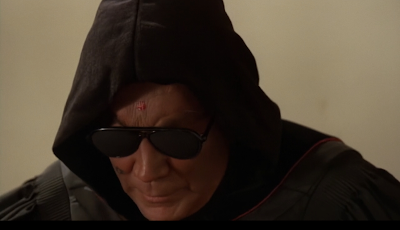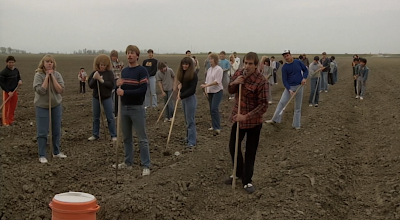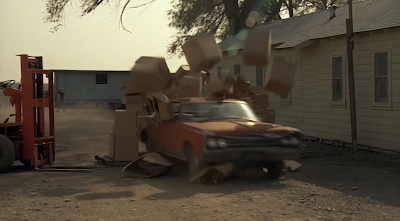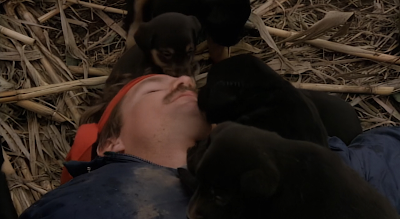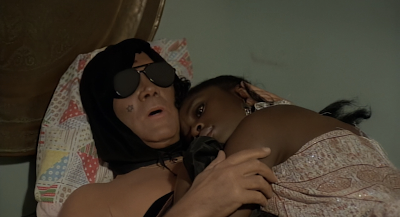We do not discuss action films much here at Senseless Cinema, so we should remedy that by reviewing Low Blow (1986), starring Cameron Mitchell, Troy Donahue, and of course action hero legend Leo Fong.
Some of your universe's respected critics are misguided about Low Blow. Reviewer dougriley, for example, writes (with at least a touch of hyperbole, I hope), "Having watched over 5000 movies in my lifetime, I can truly say this is by far the worst movie I have ever seen." Reviewer bzparkes-1 writes, "This movie is shocking. The acting is truly abominable and the attempts at humour really are pathetic." And reviewer Leofwine_draca writes, "An execrable film, so poor that I can't even classify it as an "action" movie."
Read on for an objective review of Leo Fong's action vehicle Low Blow...
Low Blow begins as all action films should, in the middle of a deli robbery. Two armed thugs yell at patrons to get their hands down, taking someone hostage but seemingly forgetting to steal any money, or for that matter any deli food. Meanwhile, across the street, middle-aged, windbreaker-wearing private detective Joe Wong, played by Leo Fong, peers through the blinds of his office and sees the robbery in progress. He slips a pistol into his waistband and tells his secretary he is “going to quiet things down.”
Mr. Fong casually enters the deli and quips, “Hey, is my ham sandwich ready?” The two robbers sit him down at a table. He reaches into his pants, says, “Okay, here’s your money,” pulls out his pistol, and shoots the robbers. Then, having successfully murdered two men, he walks out, quipping, “Hey, forget the sandwich.”
Mr. Fong walks through San Francisco for ten or fifteen minutes, and saunters into a police station, where the detectives tell him he doesn’t work for the police anymore so they should bust him for shot toting the deli robbers, but he simply walks away.
The film then plays its trump card by introducing a tattooed, hoodie-wearing Cameron Mitchell as a cult leader recruiting a beautiful young heiress into his “family.” “From now on, your name will be Purity,” he tells the young woman.
In the next scene, the young woman’s parents are eating breakfast in their mansion when the phone rings. The father, played by Troy Donahue, answers, expecting it to be about his breakfast meeting with the board, but it is his daughter’s university calling (thoughtfully but possibly illegally) because she missed two weeks of school. “Oh my God,” the mother says as if she has just been told about, say, a nuclear holocaust.
Of course, Mr. Fong becomes quickly involved in the wealthy family’s case, but first he must eat his usual dish of chicken feet soup at a Chinatown restaurant, disgusting the only Anglo woman in the place.
As soon as he takes a bite, everyone in the restaurant hears a woman outside protesting that she is being mugged, even though she is across a busy street. Mr. Fong jumps up and chases the redneck muggers into an alley, where he quickly beats them up. The entire incident (except for the chicken feet soup) is witnessed by Purity’s father from his limousine. “I think I can use him,” the wealthy man says to his chauffeur.
Instead of finishing his soup and/or paying for it, Mr. Fong returns to his parked car, which in a running gag refuses to start. He curses at the car, adjusts something under the hood, and then drives off.
Troy Donahue visits Mr. Fong’s office, having somehow figured out who he was by observing him from a limousine. On the detective’s door is a list of various services he provides.
Mr. Donahue asks Mr. Fong to find his daughter. “I’m very expensive,” the detective says, “but I guarantee results.”
At Cameron Mitchell’s cult farm, Mr. Mitchell’s assistant Karma (played by Akosua Busia from The Color Purple, released the previous year) broadcasts his message through a PA system while the cult members are hoeing dirt rows. “Only the truth of Yarakunda can bring peace. Only Yarakunda’s truth can bring…love. Only Yarakunda’s truth can bring…you…en…lightenment.” The nearly two dozen cult members all fall into a trance before being told to open their eyes and return to their chores.
The filmmakers then add a subplot, as Mr. Fong goes to a boxing gym to workout instead of working on Troy Donahue’s case. He learns about a ring of criminals running “bootleg fights” with no audiences where wealthy patrons bet (in absentia) on boxers. A Black boxer named Duke refuses to throw a match (easily mistaken, by Mr. Fong as well as the audience, for casual sparring) and is forced to punch his way out of the gym.
Eventually, Mr. Fong begins work on the case by interviewing Purity’s mother and then her college roommate Jill, a young woman who is eager to tell her story: “Well, about six months ago Karen got involved in this religion called Universal Enlightenment. In fact, she tried to get me to go to their weekly meeting. She was always talking about freeing her mind of the past, present, and future, and she did mention seeing Yarakunda—I guess he’s their head honcho or guru—um, she mentioned a place called Unity Village. I don’t know where that is.”
Coincidentally, Mr. Fong wanders into a college lecture where the professor is lecturing about the evils of the Universal Enlightenment commune. “It isn’t so much Yarakunda that’s the problem, but his woman, the real power in that commune, Karma. She’s not just from India, with saffron robes coming down with enlightenment for all us ignorant folk here. She just got out of prison! And while she was in prison, she thought, ‘What could I do to create a scam on the whole?’ This is her answer. Okay, thank you, good luck on the final now.”
Mr. Fong talks to the professor after class. “It’s very much like Jonestown,” the professor warns. “If you go in, you might not come out.”
Time for more thrilling action as Mr. Fong returns to the university parking lot just in time to see a group of hoodlums try to break into his junker car. Of course, he quickly beats up the much younger hoodlums, whose motivation in breaking into the oldest car in the lot is never explained. Mr. Fong then goes to lunch at a lunch counter, where another fight breaks out, though Mr. Fong is not involved in this fight, curiously. He meets the boxer Duke at the lunch counter and gives Duke his business card.
Coincidentally, Mr. Fong stumbles near yet another fight a few minutes later, this one at a high school where two Latino students are circling each other, about to beat each other up (they are surrounded by students as well as adult men who are betting on them). Mr. Fong beckons to a young student he knows, and he asks who one of the fighters is. “Oh, that’s Chico,” says the boy. “I don’t know his last name.” He adds with admiration, “He’s bad.”
Mr. Fong says, “He looks pretty good.”
“Yeah,” says the boy.
Mr. Fong gives the boy another business card. “Have him get in touch with me.”
Back at the cult compound, the hoodied Cameron Mitchell holds court, assisted by Karma, who repeats his every statement through a megaphone even though there are only ten to twelve cult members clustered around them.
Also, an escape attempt is thwarted by the thugs that keep order in the cult, including one thug on horseback.
Later, Mr. Fong drives to Unity Village, swerving through a stop sign as if he is in a car chase and parking his car by slamming the front corner into a concrete pillar as if he’s Frank Drebin. When he arrives at Unity Village, he receives an audience with Mr. Mitchell, who sits on a ratty old armchair on a board in a dirt field between two wooden buildings. Mr. Fong poses as a journalist but before he can ask any questions, Mr. Mitchell (who might be blind) tells him, “When you see a beautiful blossom, love it. Anyway, so your visit will not be entirely unproductive, would you do me the honor of having lunch with us?”
Before lunch, Mr. Fong is given a tour of the cult farm by two thugs. “Over here is, uh, farm equipment. Over to the left over here is, uh, our hospital. Over the right-hand side we have 800 acres of asparagus.”
The two thugs lead him to a trap, where another thug jumps out between two storage lockers and hits Mr. Fong with a billy club, knocking him out. They drag him to a room, where the cult member who attempted to escape earlier is also being held. After telling Mr. Fong his life story, the cult member explains the contrast between Cameron Mitchell and his right-hand woman Karma: he preaches peace while she parades the armed guards around the compound every night (she also has a penchant for salt-water taffy and other candy).
The two escape by convincing their guard their cell is on fire by lighting a fire in a trash can. Of course, Mr. Fong’s car won’t start, so he attempts to repair it while his cohort kicks a guard and steals a shotgun. After driving through a stack of empty cardboard boxes for no apparent reason, the two escape the compound.
Back in San Francisco, Mr. Fong and the cultist part ways, though not before the cultist tells Mr. Fong the best time to attack the compound would be a Sunday, when everyone is relaxed.
In an expert bit of characterization, we watch Mr. Fong and his secretary Diane (apparently involved in a romantic relationship) having breakfast. At the stove, she asks him how he wants his eggs. “One fried and one scrambled,” he replies. Of course, she has already made the eggs the way he likes them; she simply serves them on his plate. When he looks up at her and she asks what’s wrong, he says, “You scrambled the wrong egg.”
“Very funny. Very funny.”
An indeterminate amount of time later, a group of armed men parks in front of a house in the middle of a junkyard that might or might not be Mr. Fong’s house, as it does not match the breakfast scene at all. In any case, Mr. Fong appears and is forced to beat up the armed men. In what might be an action movie first, he subdues one man by throwing him into a litter of puppies.
In the end, Mr. Fong traps all three men in their own Mercedes, which he disables by pulling wires out of the hood, smashing all the windows with a two-by-four, and finally cutting the roof open with a convenient buzz saw lying in a chicken coop. Oddly, he allows them all to run away.
As the film moves into its final act, Mr. Fong decides to recruit a group of mercenaries to help him by holding a Tough Man Contest. This allows the filmmakers to highlight a wide variety of fighting styles and weapons while showing various fighters hitting each other in a mud puddle.
Back at the cult compound, Purity is being guarded in a medical cabin fitted with a traditional red desk lamp, where she tries to escape but is injected with a sedative. She is both unable to escape and stuck with teased hair that is extraordinarily out of control.
Mr. Fong continues recruiting tough guys (and one woman) by visiting various bar fights around San Francisco. He also meets with Troy Donahue, who exhorts him to rescue his daughter more quickly.
At sunset, Mr. Fong gathers his group of tough guys (after a tense meeting in his office) and begins his raid on the cult compound. The plan involves rowing rafts down a river, despite the fact the compound is nowhere near water.
Meanwhile, Cameron Mitchell and Karma snuggle in bed, with Mr. Mitchell wearing his black hood despite being shirtless. Mr. Mitchell mumbles some Biblical passages and Karma shushes him.
Mr. Fong and his associates take out various guards quietly, though some more violently than others—one of Mr. Fong’s men swipes at the guards with a knife, apparently killing them. Mr. Fong deals with the most difficult guard himself in a ballet of high kicks and kung fu moves that must be seen to be appreciated. Finally, Mr. Fong reaches Purity’s single-story medical cabin, where he kills one guard by stepping on his face, and injures several others by grabbing their crotches. He makes his way through the building (which has become a multi-story house with an elaborate staircase), defeating a dozen or so guards, until he finds Purity, punches her to calm her down, and then carries her out of the compound.
Outside, the raid has become a firefight. A desperate Karma, for unexplained reasons, aims her gun at Cameron Mitchell's head. We hear a shot, but we never find out what happens to Karma and her cult.
Mr. Fong returns Troy Donahue’s daughter to him. In an odd way to treat an adult woman, Mr. Donahue picks her up and carries her to his limousine. There is nothing left to do but exchange a few good-natured racist epithets, and then for Mr. Fong to try to start his car to take his secretary to Vegas. The film ends with a shot of the car in the alley as Mr. Fong repeatedly and unsuccessfully attempts to get the engine to turn over.
Low Blow is stuffed full of joy, one of the few lower-budget action films where both the fight scenes and the character comedy (consisting of Mr. Fong's car troubles and his ability to eat chicken feet soup) work well together. One might be tempted to call the film flawless, but unfortunately there is one flaw--namely, Mr. Fong walks around with a fashionable windbreaker in nearly every scene, but he never uses that windbreaker (in the right hands, one of humankind's most deadly weapons) in a fight. One can picture Mr. Fong lithely whipping the sleeves at a villain, or perhaps wrapping the jacket around someone's hands a la Jackie Chan. Aside from this oversight, however, Low Blow can only be described as the perfect action film.


